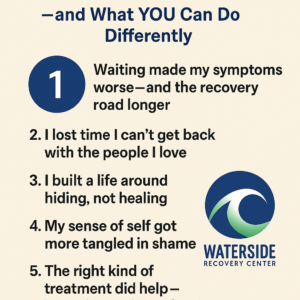I used to think I had time. That I’d “know” when I was ready. That treatment was something you did when everything fell apart, not when things were just quietly… not okay.
Spoiler: I was wrong.
I delayed opioid addiction treatment for way too long—and I paid for it in ways I’m still untangling. If you’re in Plymouth or Bristol County and wondering if now is the time to get help, maybe my story can help you skip some of the pain I didn’t.
Here are five things I wish I’d known sooner.
1. Waiting made my symptoms worse—and the recovery road longer
When I first realized I might need help, I wasn’t using every day. I told myself I was managing it. I had work. Bills were paid. I wasn’t “like those people” who needed treatment.
But addiction doesn’t wait politely while you figure things out.
My tolerance grew. My sleep disappeared. I needed more just to feel normal. And when I finally tried to stop? It felt impossible. The withdrawals weren’t just uncomfortable—they were terrifying.
The longer I waited, the more intense everything became. What could have been a manageable detox turned into a full-on medical risk. Early treatment might have shortened my healing process. Instead, I made things harder for myself.
2. I lost time I can’t get back with the people I love
This part breaks my heart. Addiction is isolating, even when you think you’re keeping up appearances. I missed moments—big and small.
There were birthdays where I showed up late, foggy, distracted. Holidays I skipped. Conversations where I wasn’t really present. I told myself it was better to pull away than to be a burden. But really, I was letting the addiction call the shots.
Relationships don’t always bounce back just because we get clean. Healing them takes time. And some of that time is gone forever.
Getting help sooner wouldn’t have erased the damage. But it could have given me a chance to start repairing things sooner.
3. I built a life around hiding, not healing
Addiction taught me how to lie—to others, and to myself.
I got really good at looking “fine.” I knew how to smile through it. How to say the right things. But underneath? I was exhausted. Anxious. Ashamed. My whole life was built around maintaining the illusion that I had it together.
And that illusion cost me real peace.
Treatment helped me start telling the truth again. First to my therapist. Then to my group. Then to the people I care about. But those walls took years to build, and they didn’t come down overnight.
If I had said yes to treatment earlier, maybe I could have spent less time performing and more time actually getting better.
4. My sense of self got more tangled in shame
Here’s the thing about waiting: it doesn’t just delay healing. It makes you question if healing is even possible.
I told myself, “You already tried once and failed.” “You’re not trying hard enough.” “Maybe you’re just broken.”
That shame becomes its own addiction. It feeds the cycle.
Real talk? Some programs didn’t help. Some felt cold or impersonal. But that didn’t mean all treatment was a dead end.
The turning point was finding a place that met me where I was—not where I “should” have been. That’s why places like Waterside Recovery matter. They understand that relapse and doubt are part of the story, not the end of it.

5. The right kind of treatment did help—but I almost didn’t find it
I almost gave up. I figured if it didn’t work the first time, it wouldn’t work the second, third, or fourth.
But what I didn’t realize is that not all treatment is the same. The program that finally helped me feel seen? It offered real options. Individualized support. People who listened, not just talked.
And maybe most importantly—they didn’t give up on me, even when I was ready to give up on myself.
If you’re reading this and feeling skeptical, I get it. But don’t let one bad fit convince you that healing isn’t possible. It is. And the right support makes a massive difference.
You Don’t Have to Wait Until It Gets Worse
If any part of this hit home—if you’ve been wondering whether it’s “bad enough” to get help—let me say this clearly: you don’t need more damage to deserve support.
You just need a little willingness to try again.
You’re allowed to be skeptical. You’re allowed to be scared. But you’re also allowed to hope that this time could be different.
Ready to talk it through? Call Waterside Recovery at (866)671-8620. We’re here to help you figure out what’s next—on your terms.
Frequently Asked Questions About Opioid Addiction Treatment in Massachusetts
Is treatment really different the second time around?
Yes—especially if you choose a program that personalizes care. Just because one type of treatment didn’t help before doesn’t mean all programs are the same. Look for options that meet you where you are today, not where you were last time.
Can I get help even if I’m still using?
Absolutely. You don’t have to be clean to reach out. Many programs, including Waterside Recovery, offer medically supervised detox and understand that active use is part of the process, not a moral failure.
What if I live in Plymouth or Bristol County and can’t travel far?
Waterside Recovery serves individuals throughout Plymouth and Bristol Counties, MA. Local treatment means you can access support without leaving your home community.
How do I know if it’s “bad enough” for treatment?
If you’re asking the question, it might already be time. You don’t need to hit rock bottom to seek help. The earlier you start, the better your chances for long-term recovery.
What makes Waterside Recovery different?
Waterside Recovery offers individualized, evidence-based care with a compassionate team that sees the person behind the substance use. Their programs are built around trust, respect, and real-life healing—not judgment.


